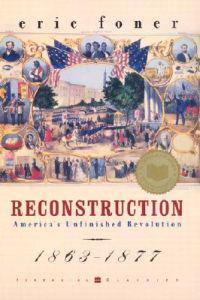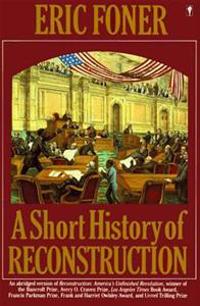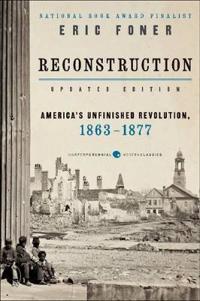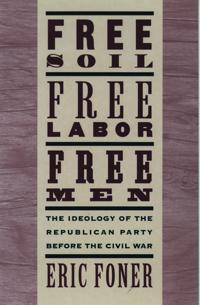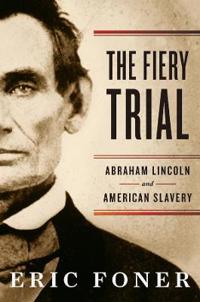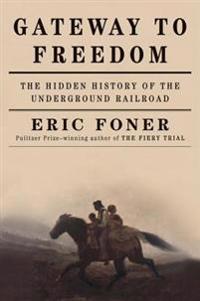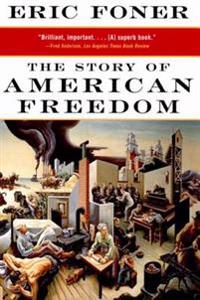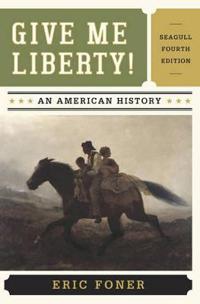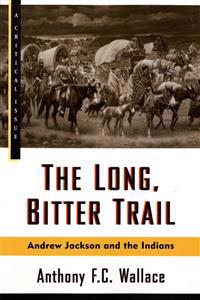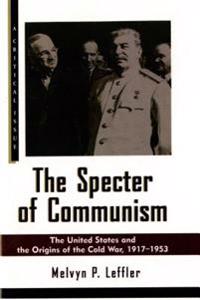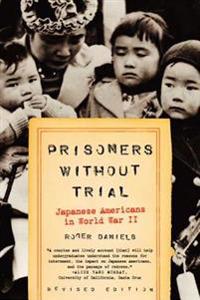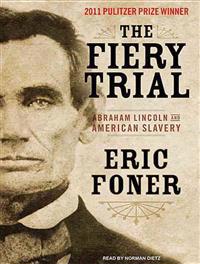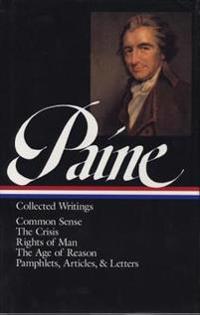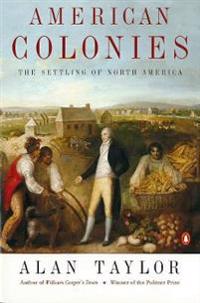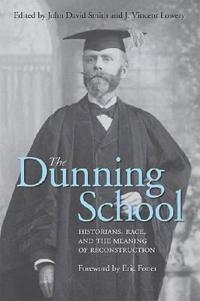Reconstruction: America's Unfinished Revolution, 1863-1877 (Häftad)
avEric Foner, Henry Steele Commager, Richard B. Morris
ISBN: 9780060937164 - UTGIVEN: 200202This "masterful treatment of one of the most complex periods of American history" (New Republic) made history when it was originally published in 1988. It redefined how Reconstruction was viewed by historians and people everywhere in its chronicling of how Americans -- black and white -- responded t[...]
A Short History of Reconstruction, 1863-1877 (Pocket)
avEric Foner
ISBN: 9780060964313 - UTGIVEN: 1989-12An abridged version of Reconstruction: America's Unfinished Revolution, the definitive study of the aftermath of the Civil War, winner of the Bancroft Prize, Avery O. Craven Prize, Los Angeles Times Book Award, Francis Parkman Prize, and Lionel Trilling Prize.[...]
Reconstruction (Pocket)
avEric Foner
ISBN: 9780062354518 - UTGIVEN: 2014-12With a New IntroductionFrom the "preeminent historian of Reconstruction" (New York Times Book Review), a newly updated edition of the prizewinning classic work on the post-Civil War period that shaped modern AmericaEric Foner's "masterful treatment of one of the most complex periods of American hist[...]
Free Soil, Free Labor, Free Men (Häftad)
avEric Foner
ISBN: 9780195094978 - UTGIVEN: 1995-04Foner has written a new introduction that puts his argument in the book into context of contemporary scholarship.[...]
The Fiery Trial (Inbunden)
avEric Foner
ISBN: 9780393066180 - UTGIVEN: 2010-10Winner of the Pulitzer Prize for History 2011
In this landmark work of deep scholarship and insight, Eric Foner gives us the definitive history of Lincoln and the end of slavery in America. Foner begins with Lincoln's youth in Indiana and Illinois and follows the trajectory of his career acr[...]Gateway to Freedom (Inbunden)
avEric Foner
ISBN: 9780393244076 - UTGIVEN: 2015-01More than any other scholar, Eric Foner has influenced our understanding of America's history. Now, making brilliant use of extraordinary evidence, the Pulitzer Prize winning historian once again reconfigures the national saga of American slavery and freedom. A deeply entrenched institution, slavery[...]
The Story of American Freedom (Häftad)
avEric Foner
ISBN: 9780393319620 - UTGIVEN: 1999-11From the Revolution to our own time, freedom has been America's strongest cultural bond and its most perilous fault line, a birthright for some Americans and a cruel mockery for others. Eric Foner takes freedom not as a timeless truth but as a value whose meaning and scope have been contested throug[...]
The Fiery Trial (Pocket)
avEric Foner
ISBN: 9780393340662 - UTGIVEN: 2011-09In a landmark work of deep scholarship and insight, Eric Foner gives us a life of Lincoln as it intertwined with slavery, the defining issue of the time and the tragic hallmark of American history. As the nation expanded into new western territories and economic pursuits, the continuing strength of [...]
Give Me Liberty! (Inbunden)
avEric Foner
ISBN: 9780393920260 - UTGIVEN: 2013-10-29It's the leading text in the field because it works in the classroom.
Give Me Liberty!: An American History (Pocket)
avEric Foner
ISBN: 9780393920277 - UTGIVEN: 2013-10-01Give Me Liberty!: An American History (Pocket)
avEric Foner
ISBN: 9780393920284 - UTGIVEN: 2013-10-01Give Me Liberty! (Pocket)
avEric Foner
ISBN: 9780393920291 - UTGIVEN: 2013-10Clear, concise, integrated, and up-to-date, Give Me Liberty! is a proven success with teachers and students. Eric Foner pulls the pieces of the past together into a cohesive picture, using the theme of freedom throughout. The Fourth Edition features stronger coverage of American religion and a reinf[...]
Give Me Liberty !: An American History: Volume 1 (Pocket)
avEric Foner
ISBN: 9780393920307 - UTGIVEN: 2013-12-20Give Me Liberty !: An American History: Volume 2 (Pocket)
avEric Foner
ISBN: 9780393920314 - UTGIVEN: 2013-12-13Give Me Liberty!: An American History (Pocket)
avEric Foner
ISBN: 9780393920321 - UTGIVEN: 2013-10-29The Long, Bitter Trail: Andrew Jackson and the Indians (Häftad)
avAnthony F. C. Wallace, Eric Foner
ISBN: 9780809015528 - UTGIVEN: 1993-07The Hill and Wang Critical Issues Series: concise, affordable works on pivotal topics in American history, society, and politics.
This account of Congress's Indian Removal Act of 1830 focuses on the plight of the Indians of the Southeast--Cherokees, Creeks, Choctaws, Chickasaws, and Seminoles--w[...]The Specter of Communism: The United States and the Origins of the Cold War, 1917-1953 (Häftad)
avMelvyn P. Leffler, Eric Foner
ISBN: 9780809015740 - UTGIVEN: 199410The Hill and Wang Critical Issues Series: concise, affordable works on pivotal topics in American history, society, and politics.
"The Specter of Communism is a concise history of the origins of the Cold War and the evolution of U.S.-Soviet relations, from the Bolshevik revolution to the death o[...]Prisoners Without Trial: Japanese Americans in World War II (Häftad)
avRoger Daniels, Eric Foner
ISBN: 9780809078967 - UTGIVEN: 2004-10Part of Hill and Wang's Critical Issues Series and well established on college reading lists, PRISONERS WITHOUT TRIAL presents a concise introduction to a shameful chapter in American history: the incarceration of nearly 120,000 Japanese Americans during World War II. With a revised final chapter an[...]
The Struggle for Black Equality (Häftad)
avHarvard Sitkoff, Eric Foner, John Hope Franklin
ISBN: 9780809089246 - UTGIVEN: 200809The Fiery Trial: Abraham Lincoln and American Slavery (Övrigt)
avEric Foner
ISBN: 9781400169603 - UTGIVEN: 2010-10In this landmark work of deep scholarship and insight, Eric Foner gives us the definitive history of Abraham Lincoln and the end of slavery in America. Foner begins with Lincoln's youth in Indiana and Illinois and follows the trajectory of his career across an increasingly tense and shifting politic[...]
Paine: Collected Writings (Inbunden)
avThomas Paine, Eric Foner
ISBN: 9781883011031 - UTGIVEN: 1995-03American Colonies (Pocket)
avAlan Taylor, Eric (EDT) Foner, Alan Taylor
ISBN: 9780142002100 - UTGIVEN: 2002-08An acclaimed historian challenges the traditional Anglocentric focus of colonial history by examining the various cultural influences from which "America" emerged and documenting the intricate ecological, ethnic, and economic history of the New World, from the Canadian north to the Pacific rim. Repr[...]
The Dunning School (Inbunden)
avJohn David (EDT) Smith, J. Vincent (EDT) Lowery, Eric (FRW) Foner
ISBN: 9780813142258 - UTGIVEN: 2013-10From the late nineteenth century until World War I, a group of Columbia University students gathered under the mentorship of the renowned historian William Archibald Dunning (1857-1922). Known as the Dunning School, these students wrote the first generation of state studies on the Reconstruction-vol[...]

